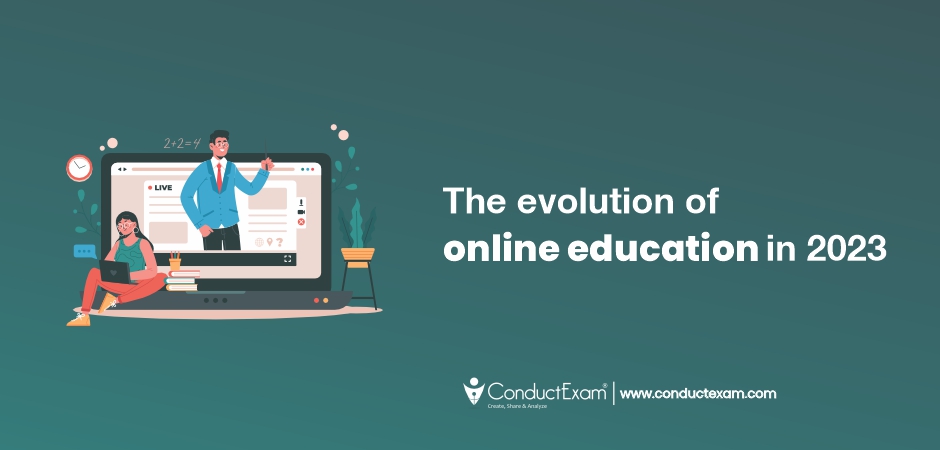Introduction
“Education is what remains after one has forgotten what one has learned in school.”
Education is the key to change. With continuous learning and education improvement, you can change the landscape of one nation. Education can change the way we think in any country. However, it is through educational institutes that you impart knowledge to the new generation. Education is evolving every year. The Indian government’s NEP (New Education Policy) 2020 changes the whole learning criteria in the education system. However, online education is another aspect of the evolutionary process.
In 2023, online education can reach new heights. It can become an integral part of the global education landscape. In this blog, we will cover the different types of online education and learning. We also cover topics of evolution in 2023.
Different types of online learning or online education
1) Live learning (online learning)
However, live learning is the most preferable for the student. It is the process where students interact with the teachers on live platforms. Nowadays, most educational institutes are giving their courses or live teaching through their mobile-based or web-based applications. For example, UPSC aspirants can learn from home without going to the coaching centre. It is a cost-effective solution.
2) Interactive learning
Every online course should be interactive. Because it helps students ask questions of the educators in the live session. Moreover, it also helps to give feedback to teachers. This increases the teacher’s understanding of what the student lacks in the study.
Most of the online learning platforms offer interactive learning. They found the importance of interaction and communication learning.
3) Self-paced learning
This learning is also known as asynchronous learning. However, it is not focused on real-time. Self-paced learning is mostly focused on the learning material, like documents, PDFs, recorded lectures, etc.
An example of this type of learning is when a candidate tries to learn on their own, through study material, step by step. It is mostly on the candidate who is preparing for the exam within their work or job.
4) Individual learning
Online individual learning occurs when instructors and peers are not actively involved in the learning process of an individual student and is a virtual form of learning. The learner is provided with automated feedback and evaluation of progress based on their needs and performance.
The learner uses this type of learning when he or she is looking for courses that are not necessarily driven by peers or classroom-oriented but rather that meet his or her individual needs. In most cases, however, synchronous or live learning may be involved in this form of learning since students prefer to study at their own pace rather than in a live and interactive setting.
There are several online learning platforms that offer individual short-term and long-term MOOCs that can be taken up by any learner without any time constraints or deadlines and then completed at their own pace.
5) Hybrid Learning
Hybrid learning involves both online learning and self-paced learning. Organisations provide live classes and recorded classes in one application. However, it is a more beneficial approach.
Evolution of online education in 2023
The Rise of Micro-Learning
In 2023, most educational institutes will focus on micro-learning information. Micro-learning is the process of delivering educational content on a short and focused topic. This type of education is fast-paced and focuses on an on-the-go approach.
Example: You can show YouTube videos where educators only focus on the sub-topics of one chapter of one particular subject. It helps students to just understand the particular topic rather than the whole chapter.
Nowadays, organisations share knowledge or pieces of information on their social media platforms. It can help you learn in just a few minutes. It makes it easy for students to fit learning into their busy schedules.
The flexibility of micro-learning has made it a valuable tool for professional development. It allows workers to upskill efficiently. With the social platform, you can acquire knowledge or skills when you need them.
Virtual reality (VR) and augmented reality (AR)
This year, it marks the integration of VR and AR technologies into online education. These technologies have the potential to revolutionise the way students learn. The VR headset provides a realistic simulation. It enhances comprehension and retention.
The education field, like engineering, gives the extra benefit of VR and AR headsets. It allows students to practice the procedures or practices in real-world scenarios. Virtual prototypes or projects help medicine and architecture students visualise more perfectly. However, this virtual and augmented reality accelerates the learning process. It makes complex subjects more accessible and engaging.
Global Collaboration
Online education continues on its way to breaking down geographical boundaries. It fosters global collaboration among learners and educators. Online or virtual classrooms connect different parts of the world. Students can connect easily with their smart devices to the different courses.
Webinars are part of online learning. However, different organisations perform webinars in different parts of the world. There are tonnes of platforms used for the webinars. Here are some examples of it.
Educational institutions and organisations are creating partnerships with other countries to offer joint programmes and collaborative research opportunities. This globalised approach to education prepares the students for more understanding.
Personalised learning paths
Personalised learning is one of the online exam software trends in 2023. Through the use of AI and machine learning algorithms, it helps deliver personalised learning experiences. As we saw in an earlier blog, personalisation allows learners to learn at their own pace. It makes education more effective and engaging.
Conduct the assessment process after the online education.
Conduct Exam offers an online exam software solution for schools, colleges, and other coaching institutes to conduct an assessment process after online learning. This online assessment offers various advantages to students as well as educators.
However, as we move forward, it is clear that online education will continue to evolve. Evolution signifies a fundamental shift in how we approach education. It makes it more inclusive, flexible, and responsive to the diverse needs of learners.





Leave A Comment